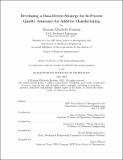Developing a Data-Driven Strategy for In-Process Quality Assurance for Additive Manufacturing
Author(s)
Ibrahim, Mariam Elisabeth
DownloadThesis PDF (1.274Mb)
Advisor
Jónasson, Jónas,
Hart, Anastasios John
Terms of use
Metadata
Show full item recordAbstract
Additive manufacturing has transformed production by introducing a digital approach to manufacturing. Modern additive machinery consists of sensors that provide real- time data on environmental conditions; as a result, significantly more quantitative information is available for a manufacturing process. The applications for sensor-based data are numerous, especially when considered in tandem with information from across the entire process flow. This thesis examines the use of three main types of data in the additive process - feedstock age, environmental conditions, and furnace dynamics - to predict three specific quality outcomes (chemistry, porosity, and solid density) in medical implants at Stryker. By way of a series of predictive models, two main results are achieved for each quality test. First, input variable importance is quantified, enabling a deeper understanding of the significance of each leveraged data set in predicting quality. Second, models are designed to enable a double-digit percent reduction in testing volumes, enabling cost savings and increases in operational efficiencies. Quantifying variable significance enables future work to focus on improving predictions by investing in the quality of specific data sets. More broadly, the findings serve as a proof-of-concept for the impact of leveraging modern data science in additive manufacturing. While this work focuses on a single product line, the methodology can scale. In particular, gains may be far greater in industries that have higher failure-rate tolerances as a result of fewer issues with class imbalances in modeling.
Date issued
2023-06Department
Massachusetts Institute of Technology. Department of Mechanical Engineering; Sloan School of ManagementPublisher
Massachusetts Institute of Technology